

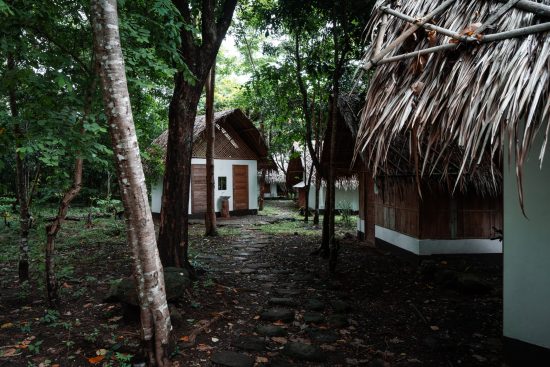
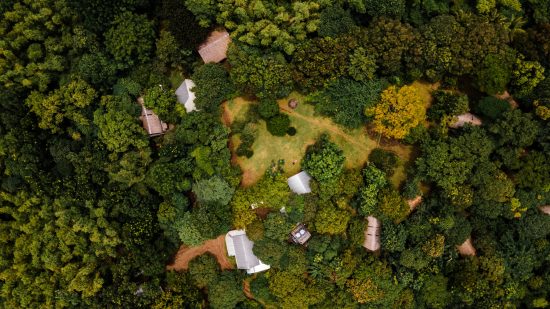
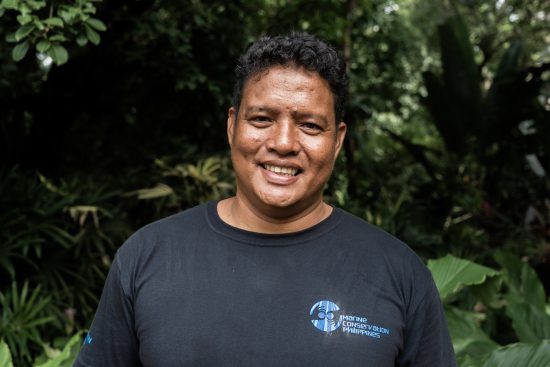
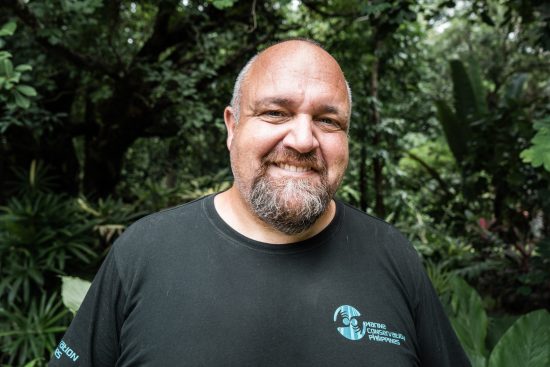
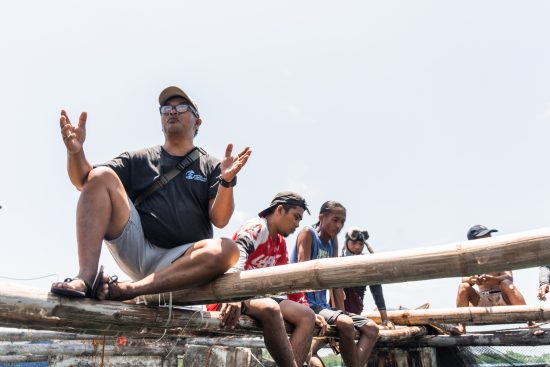
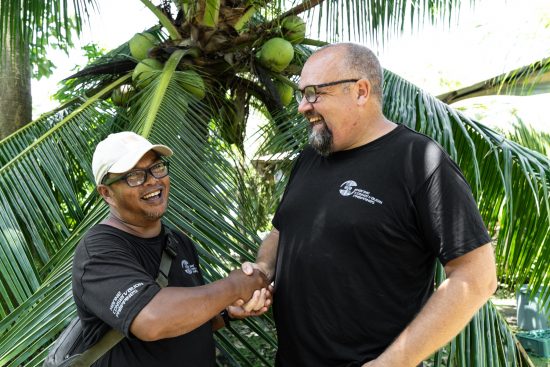
Another day, another mission. Waking to the sound of a gong made from old kitchenware, a diverse community of dedicated volunteers descend upon the main community hub from their shared dorms.
The highly entertaining and thorough morning briefing run by the staff lays out the daily agenda, noting which of the 15 volunteers are headed off on what trucks to tackle which program. Everyone is clear on their objectives for the day—whether conducting dive training, partaking in substrate surveys, meeting with local politicians, collating scientific data, leading community education programs, or creating new vegetarian recipes.
Marine Conservation Philippines (MCP) is situated in Negros Oriental, which has become somewhat of an epicenter for those from all walks of life looking for a deeper purpose. Why is this remote corner of the world a hot spot for ocean conservation? Because in the 80’s there was the second ever Marine Protected Area (MPA) in the Philippines, established off these shores due to its incredible biodiversity, coral sanctuaries and abundance of plant and fish life.
MCP founders Søren & Helle Knudsen—former teachers from Denmark—came to the Philippines on holiday and never left. After falling in love with Negros Oriental, they dreamed of establishing a ocean nonprofit that was built on the fundamentals of education, tapping into their deepest passions found at home and further developed abroad.
Over a decade later, this conduit community is now thriving, bringing together volunteers, scientists, and local stakeholders all around a common purpose—to guarantee a long-term future of ocean health, local food security and societal stability.
Our journey led us on a quest to discover a nonprofit in the Philippines that embodies the spirit of citizen science. There exists a prevailing notion suggesting that ocean conservation and restoration are domains reserved exclusively for professional scientists. But my team and I have always felt that this mindset is obsolete. The complexities of forging a sustainable future demand the convergence of diverse skills, experiences and backgrounds. We sought a team illuminating this path, offering tangible success stories that underscore the power of inclusive and collective effort in conservation.
And that’s how we ended up at MCP, sitting at their morning briefing, receiving assignments for the day, all after a wild night’s sleep in our jungle bunk beds.
MCP, known for its citizen science program, empowers driven volunteers from all around the world to combine efforts on behalf of ocean ecosystems of South Negros. MCP caps the volunteer count at 30 people to ensure an intimate experience for all. It also provides the best possible environment to foster everyone’s unique interests and purpose at this size cap.
Volunteer work comprises a variety of ongoing reef and substrate monitoring using scientific techniques taught on-base. These repeated daily efforts go towards the construction and maintenance of databases used to keep Local Government Units (LGUs) and other key stakeholders informed on how to best manage MPAs, or establish where to establish new ones.
Søren acknowledges that the pre-existing conditions in the local marine environment—such as micro-plastic pollution, depleted fish stocks and coral reef damage—can seem like a mountain of impossible challenges to overcome. But however difficult it may be to combat these overwhelming feelings, Søren always follows his mantra of “what you do matters.” His example is living proof that one person’s will can go a long way. What you buy, how you commute, what you eat and how you choose to live: all of these decisions matter.
For him, identifying and empowering local champions has been at the heart of what’s needed to protect and restore the ocean. These individuals are vital in amplifying the conservation message within their communities. Equipping them with the necessary education and support is essential, not only for individual growth, but for effectively addressing and overcoming the prevailing community attitudes and skepticism towards ocean conservation.
Navigating through historical layers of distrust and resistance is always going to be challenging, but it is a critical component in fostering enduring change. These grounded, informed advocates are instrumental in bridging gaps and fostering a communal shift towards environmental conservation.
Mario ‘Neil’ Montemar is one such champion that has over time become a vital lynchpin in the ocean narrative in these parts.
Neil is as busy as any one person can be, and it would take your entire afternoon to list out all the organizations he currently heads up. He fills presidential or chairman roles in many of them, from Municipal Agriculture and Fishery Council, to Area 4 Marine and the Local Fishermen’s Association.
Neil is dedicated to fostering open communication, transparency and appropriate resource allocation in his daily operations. He serves as a bridge between community members, local stakeholders, higher-level entities such as LGUs, nonprofits and the fishing industry—as he himself is a fisherman.
His goal is to ensure everyone's voice is acknowledged and considered. His passion for advocating change drives him to represent his community at national conferences, often at his own expense, exemplifying his unwavering commitment to the cause, his community and the future.
Then there is Ceasar Ruiez, yet another extraordinary ground-roots story.
Raised in a small commercial fishing village, Ceasar was accustomed to a lifestyle where the ocean's bounty was perceived solely as a means to an end. Every fish equated to money, essential for feeding families and meeting basic needs.
In Ceasar's community, the contact with the intricate underwater ecosystems was unrestrained and inadvertent. The practice of treading upon every marine creature, including the breaking of corals, was a commonplace occurrence. The ocean, in its vast expanse, was narrowly interpreted through the lens of an immediate need for survival.
Ceasar's individual transformation began with a fortuitous meeting with Søren, who offered a different perspective of the ocean’s ecosystem. He learned that corals, once deemed insignificant, were fragile and essential forms of marine life. This enlightenment propelled Ceasar into seeking dive training, enhancing his connection and understanding of the marine world. During this period of growth, he transitioned from fishing to repairing and maintaining diving equipment.
His skills in equipment maintenance not only provided a new income stream for him and his family, but also aligned his work with the preservation of the marine world. This change underscored the impactful role of education in fostering respect and care for the ocean, highlighting his journey from inadvertent harm to active preservation.
He went one step further by extending the sphere of his knowledge through educational outreach. Bi-monthly, he engages school children and local groups, unveiling the underwater world’s marvels and emphasizing its protection as a communal responsibility. His programs don’t merely focus on marine conservation but also spotlights alternative livelihoods, such as dive guiding and maintenance work, aiming to diverge the focus from fishing.
Today, his new vision is to uplift the scuba diving value of his community, seeding a diverse array of opportunities for upcoming generations. He is a firm believer in the transformative power of education and its impact, based on his own personal experiences. For him, proactive engagement in nurturing and protecting the ocean’s bounty is not just a choice but a necessity.
“At least we do something, rather than doing nothing.” - Ceasar Ruiez
The conservation agenda at MCP is as much about the ongoing research and scientific studies as it is about finding a sustainable balance between the economic need and the environmental harm of fishing practices.
Both come with their own sets of challenges for pioneering new ways of doing things, but only one involves facing decades of ingrained behaviors, concepts and resistance to change. For navigating this with a smile on their faces every day, Søren says he would Knight the likes of Neil, Ceasar and other local champions if he could. Their tireless efforts in fighting for a better future for all living things never goes unnoticed.
Our week at the MCP basecamp deeply connected us to a dedicated team of volunteers, staff and community advocates. Each conversation, rich with passion and commitment, revealed a shared love for the ocean and a relentless pursuit to contribute to its preservation. And living on the fringe highlighted the power of collective action.
Here, collaboration isn't a lofty ideal but a practical, everyday reality that fuels many people’s efforts from all corners of the world. We were reminded that every choice we make has a ripple effect on the health of the ocean and humankind’s longevity. It’s a call to action, fortifying the collective responsibility we hold.
So, like our friends living on the edges of earth in Negros Oriental, let’s unite in our diverse capacities to make meaningful contributions. After all, the ocean's future is not just in their hands, but ours as well.
—
Marine Conservation Philippines (MCP) a registered non-governmental organization (NGO) dedicated to preserving and protecting coastal resources in the Philippines through education, volunteerism and research. The team engages local communities and policy makers and work to ensure solutions that will benefit both humans and nature in the long run. Key areas of focus include underwater science, community outreach & education, ocean plastics, mangrove rehabilitation and food policy. Learn how to become a volunteer and to work with MCP to radically alter your world.
 Andi
Andi 2nd April 2024
2nd April 2024